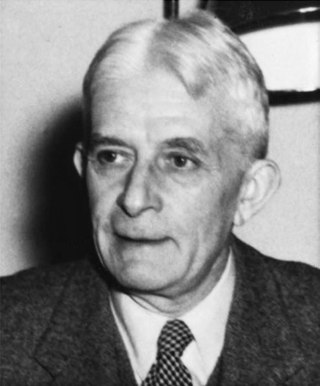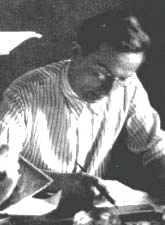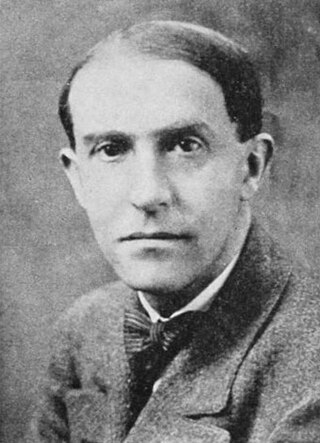
Johannes Wilhelm Cornelius (27 September 1863 - 23 August 1947) was a German neo-Kantian philosopher and psychologist.

Johannes Wilhelm Cornelius (27 September 1863 - 23 August 1947) was a German neo-Kantian philosopher and psychologist.
Born in Munich, Kingdom of Bavaria on 27 September 1863, he originally studied mathematics, physics, and chemistry, graduating with a Ph.D. in 1886, before turning to philosophy. In 1894, he habilitated in philosophy and subsequently held a post in philosophy at the University of Munich (until 1903 as a Privatdozent ). In 1910, Cornelius moved as a full professor to the Akademie für Sozialwissenschaften, which four years later would become a department of the newly founded University of Frankfurt. Among his students in Frankfurt were Max Horkheimer [1] and Theodor Adorno.
His work was influenced by psychologist Max Wertheimer. [2]
Cornelius, who was a consistent opponent of World War I, joined the Social Democratic Party of Germany (SPD) in 1918 and in the 1920s, he promoted the plan of a European confederation. He supported the idea of a League of Nations in his paper Völkerbund und Dauerfriede (1919).
Hans Cornelius married Emilie (Mia) von Dessauer (1862–1946), a daughter of Heinrich von Dessauer (1830–1879), a physician and founder of the German hospital in Valparaiso, in 1887; Ingeborg Karlson (1894–1924), from Liljeholmen near Stockholm, in 1915, in his second marriage; and Friedrike Rosenthal, widowed Reissner (1886–1939), in 1925, in his third marriage. In 1941 he entered into a fourth marriage with Hedwig Krämer, widowed Drechsel (born 1896). Four children came from the first marriage: the later geologist Hans Peter Cornelius (1888–1950), Wolfgang (born 1890), Friedrich (1893–1976) and Evi (born 1894). The second marriage resulted in two sons, Yngor [Yngve] (born 1921) and Hans Wolfgang Amadeus (1923–2013).
Cornelius retired in 1928. He died in 1947 in Gräfelfing.

Max Horkheimer was a German philosopher and sociologist who was famous for his work in critical theory as a member of the Frankfurt School of social research. Horkheimer addressed authoritarianism, militarism, economic disruption, environmental crisis, and the poverty of mass culture using the philosophy of history as a framework. This became the foundation of critical theory. His most important works include Eclipse of Reason (1947), Between Philosophy and Social Science (1930–1938) and, in collaboration with Theodor Adorno, Dialectic of Enlightenment (1947). Through the Frankfurt School, Horkheimer planned, supported and made other significant works possible.
Gestalt psychology, gestaltism, or configurationism is a school of psychology and a theory of perception that emphasises the processing of entire patterns and configurations, and not merely individual components. It emerged in the early twentieth century in Austria and Germany as a rejection of basic principles of Wilhelm Wundt's and Edward Titchener's elementalist and structuralist psychology.

The Frankfurt School is a school of thought in sociology and critical philosophy. It is associated with the Institute for Social Research founded at Goethe University Frankfurt in 1923. Formed during the Weimar Republic during the European interwar period, the first generation of the Frankfurt School was composed of intellectuals, academics, and political dissidents dissatisfied with the socio-economic systems of the 1930s: namely, capitalism, fascism, and communism. Significant figures associated with the school include Max Horkheimer, Theodor Adorno, Walter Benjamin, Wilhelm Reich, Herbert Marcuse, and Jürgen Habermas.

Max Wertheimer was a psychologist who was one of the three founders of Gestalt psychology, along with Kurt Koffka and Wolfgang Köhler. He is known for his book, Productive Thinking, and for conceiving the phi phenomenon as part of his work in Gestalt psychology.

Wolfgang Köhler was a German psychologist and phenomenologist who, like Max Wertheimer and Kurt Koffka, contributed to the creation of Gestalt psychology.

The Institute for Social Research is a research organization for sociology and continental philosophy, best known as the institutional home of the Frankfurt School and critical theory. Currently a part of Goethe University Frankfurt, it has historically also been affiliated with Columbia University in New York City.
Gestalt Theoretical Psychotherapy(GTP) is a method of psychotherapy based strictly on Gestalt psychology. Its origins go back to the 1920s when Gestalt psychology founder Max Wertheimer, Kurt Lewin and their colleagues and students started to apply the holistic and systems theoretical Gestalt psychology concepts in the field of psychopathology and clinical psychology. Through holism, "a person's thinking, feeling, actions, perceptions, attitudes and logical operations" are seen as one unity. Many developments in psychotherapy in the following decades drew from these early beginnings, like e.g. group psychoanalysis (S. Foulkes), Gestalt therapy (Laura Perls, Fritz Perls, Goodman, and others), or Katathym-imaginative Psychotherapy (Hanscarl Leuner).

Rudolf Arnheim was a German-born writer, art and film theorist, and perceptual psychologist. He learned Gestalt psychology from studying under Max Wertheimer and Wolfgang Köhler at the University of Berlin and applied it to art.
Wolfgang Metzger is considered one of the main representatives of Gestalt psychology in Germany.
The School of Brentano was a group of philosophers and psychologists who studied with Franz Brentano and were essentially influenced by him. While it was never a school in the traditional sense, Brentano tried to maintain some cohesion in the school. However, two of his most famous students, Alexius Meinong and Edmund Husserl, ultimately moved radically beyond his theories.
Munich phenomenology is the philosophical orientation of a group of philosophers and psychologists that studied and worked in Munich at the turn of the twentieth century. Their views are grouped under the names realistphenomenology or phenomenology of essences. Munich phenomenology represents one branch of what is referred to as the early phenomenology. One of their contributions was the theory that there are different kinds of intentionality.

The Gottfried Wilhelm Leibniz Prize, or Leibniz Prize, is awarded by the German Research Foundation to "exceptional scientists and academics for their outstanding achievements in the field of research". Since 1986, up to ten prizes have been awarded annually to individuals or research groups working at a research institution in Germany or at a German research institution abroad. It is considered the most important research award in Germany.
Freudo-Marxism is a loose designation for philosophical perspectives informed by both the Marxist philosophy of Karl Marx and the psychoanalytic theory of Sigmund Freud. Its history within continental philosophy began in the 1920s and '30s and running since through critical theory, Lacanian psychoanalysis, and post-structuralism.
Kurt Riezler was a German philosopher and diplomat. A top-level cabinet adviser in the German Empire and the Weimar Republic, he negotiated Germany's underwriting of Russia's October Revolution and authored the 1914 September Program which outlined German war aims during World War I. The posthumous publication of his secret notes and diaries played a role in the "Fischer Controversy" among German historians in the early 1960s.
Abraham S. Luchins was an American Gestalt psychologist and a pioneer of group psychotherapy. He was born in Brooklyn, New York and died in New York.
Friedrich Schumann (1863–1940) was a German psychologist.

Mary Henle was an American psychologist who's known most notably for her contributions to Gestalt Psychology and for her involvement in the American Psychological Association. Henle also taught at the New School of Social Research in New York; she was involved in the writing of eight book publications and also helped develop the first psychology laboratory manual in 1948 based on the famous works of Kurt Lewin.
Goethe Plaque of the City of Frankfurt is an award conferred by Frankfurt, Hesse, Germany and named after Johann Wolfgang von Goethe. The plaque was originally designed by sculptor Harold Winter. The plaque is awarded at irregular intervals to important poets, writers, artists, scientists and other personalities of the cultural life.

Kurt Koffka was a German psychologist and professor. He was born and educated in Berlin, Germany; he died in Northampton, Massachusetts, from coronary thrombosis. He was influenced by his maternal uncle, a biologist, to pursue science. He had many interests including visual perception, brain damage, sound localization, developmental psychology, and experimental psychology. He worked alongside Max Wertheimer and Wolfgang Köhler to develop Gestalt psychology. Koffka had several publications including "The Growth of the Mind: An Introduction to Child Psychology" (1924) and "The Principles of Gestalt Psychology" (1935) which elaborated on his research.

Gabriele von Wartensleben was a German psychologist who published the first academic statement on Gestalt theory. She additionally was the first woman to receive a PhD in psychology from University of Vienna through an honorary degree.